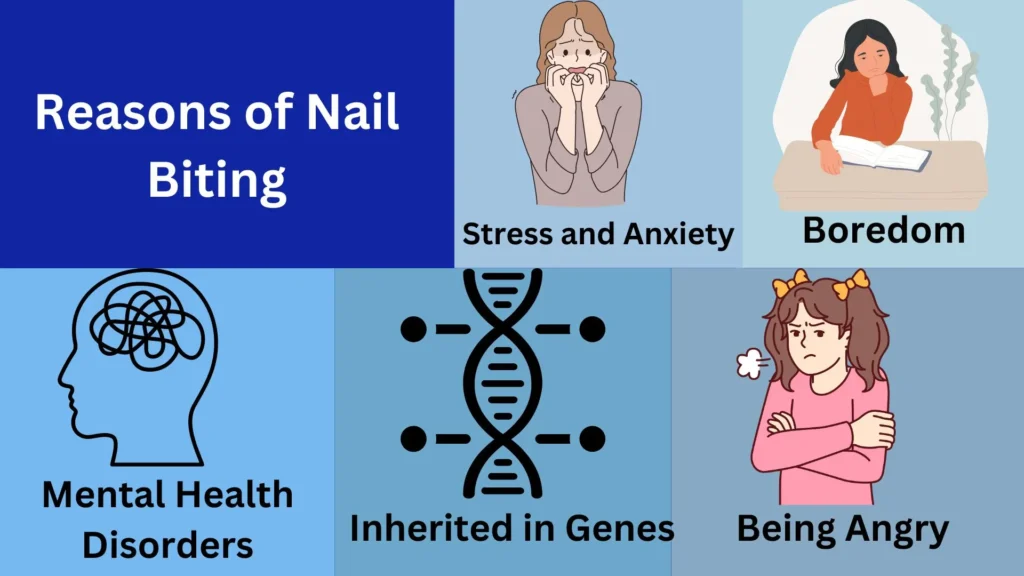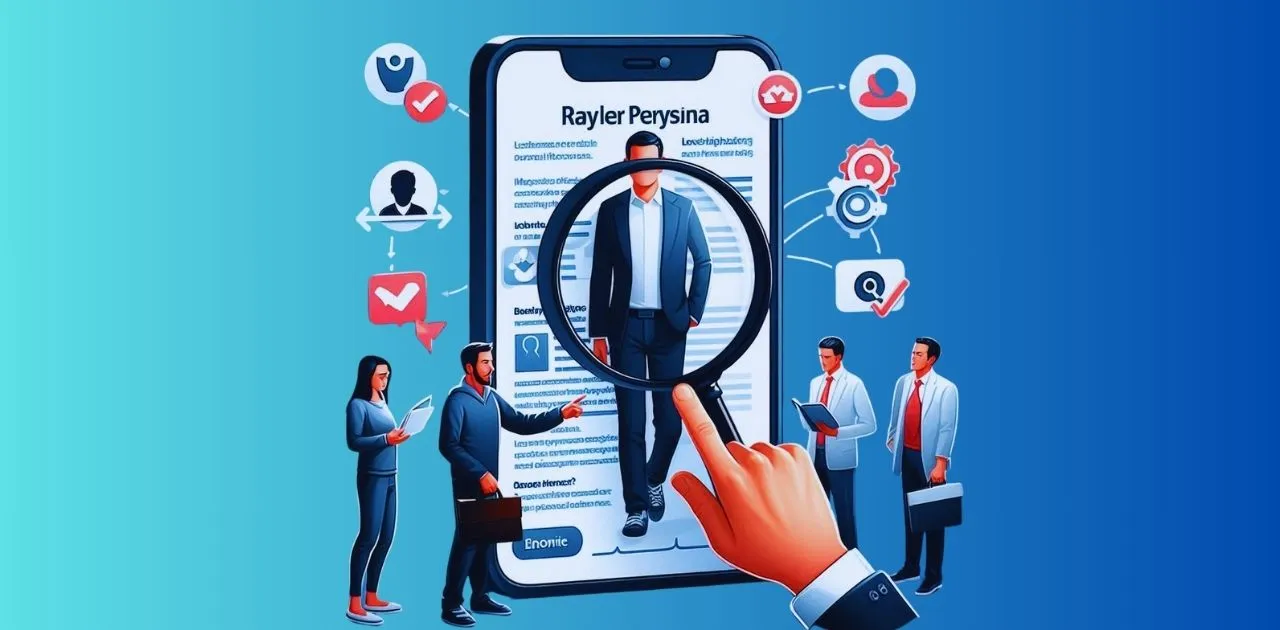Nail biting, or Onychophagia, is a serious problem that is common in many people. It can affect children as well as adults.
If you are not biting your nails, then you might have experienced it in some stage of life. This is a common issue that is caused by many factors, such as stress, boredom, and many other mental health disorders.
It is very important to stop nail-biting habits. They cause social embarrassment and damage the tissues around the nails.
There are different practical ways, such as stress-free activities, engaging in physical exercise, and many more, to break the habit of nail biting. Read thoroughly to stop nail biting.
Table of Contents
What is Nail Biting?
Nail biting is a common habit in which a person bites or chews on their fingernails. The medical name for this habit is Onychophagia. Nail biting often begins in early childhood and can continue into adulthood.
20 to 30 % of Americans are nail-biters. There are various reasons for nail biting, but some common are stress and boredom. It can also occur due to a non-apparent issue.
Major Reasons for Nail Biting
It is important to know the why of nail-biting before getting on to know how to stop it. The reasons for the habit of nail-biting vary, but there is no single reason. The major reasons are given as:

I. Stress and Anxiety
Stress and anxiety are said to be the most common causes of nail-biting, just like insomnia in America. When people are depressed and feel pressure, they bite their nails. It seems that nail biting is a way of releasing stress and pressure. You may have noticed that people often bite nails when they are confused or under pressure.
II. Boredom
Boredom is another major cause of nail biting. During boredom, it is very common for people to chew their nails, lips, or tongue. It is sometimes seen as a way to get out of boredom. It is said that during frustration, it is better to do something than nothing.
III. Mental Health Disorders
According to the American Psychiatric Association, nail biting is a mental health disorder. It is characterized by body-focused repetitive behavior that comes under obsessive-compulsive disorder. During this behavior and mental condition, people have some unwanted thoughts, ideas, and emotional sensations that make them do something repetitively.
IV. Inherited in Genes
Some experts believe that nail biting is a genetic issue. Parents who have experienced this habit also develop nail-biting in their kids. Some studies suggest that if you are a nail-biter, you most likely picked this habit up from your parents or peers. However, the description and detailed account of how genes play a role in nail-biting is not known.
Some statistics show that
- 30% of nail biters have at least one family member who is a nail biter.
- Twin studies show that it is more likely for identical twins to be nail-biters rather than fraternal twins.
V. Being Angry
It is also observed that when adults are experiencing extreme emotions like hunger, anger, etc., they bite their nails. It is very common for people to bite their nails when they are angry. This way, they absorb their anger and try to cool down. It is also possible that they bite their nails when they are angry but have no authority.
How to Stop Nail Biting Habit?
There are many ways to stop the habit of nail biting. The following are some practical ways to apply them.
1. Identify the Reason
The very first and important step is to find the trigger that causes you to bite your nails. Unless you know what makes you repeat this behavior, you cannot stop it. Various reasons, such as stress and anxiety, genetic issues, mental health conditions, etc., can cause the habit of nail-biting in adults.
Identify the basic factor that causes this problem and then work on one of the following ways to stop it.
2. Cut Them Short
If you are a nail-biter, you should keep your nails short. Don’t make them lengthy. Lengthy nails are medically not a good practice, but they are more problematic for you. If your nails are short, your chances of biting are reduced by more than 50%.
The easiest solution for preventing nail biting is to cut nails short. However, if the reason is stress and anxiety, then even short nails cannot stop you. In such cases, you should follow other methods, such as the following.
3. Be Involved in a Physical Activity
Physical activity is an extremely important technique against nail biting. It is one of the major habits and parts of every successful person in today’s world.
Involve yourself in something that keeps you busy, especially your hands and mouth. You can play sports, online games, and many other games. You can also keep your hands busy by keeping your fingers away from your mouth.
Indulge in cooking, writing, knitting, crocheting, etc, to keep your hands busy.
4. Use & Coat your Nails with Bitter Polish
One of the most applicable strategies is to apply a bad-tasting and bitter nail polish to your nails. It can prevent you, to a large extent, from biting. The taste will compel you not to bite or chew your nails.
You can also make some homemade nail care recipes and apply them when you are free. Next time, make sure you use a bitter one so that you cannot bite.
5. Manicures
Treat yourself to manicures. Visit a salon where you can spend time and energy on your nails. Experts view time and energy spent on anything as valuable. Doing this will likely prevent you from biting your nails.
Manicures also act as a protective sheath that prevents chewing your nails.
6. Habit Guide and Reversal
Habit training and guidance can also be influential in preventing this habit. Get training by reading and interacting with experienced and expert individuals. Habit reversal training helps you stop nail biting. It involves replacing a harmful habit with a healthier one. It can also be done through habit stacking.
7. One Finger at a Time
Success always lasts long when it is slow but consistent. As for the rules of atomic habits, try to build habits in steps. Divide habits into different small steps and then start working on them. It will take time, but it will lead you to success.
Take a gradual approach to ending a nail-biting habit. Work on resisting one finger before moving on to the next until you work your way up to the whole hand. Breaking a habit into different steps can be helpful for many people.
8. Social Support
Social support and sincere friends can also help you stop the habit of nail biting. Talk to your friends when you are under pressure. Sit with people from your social circle and discuss your issues with them.
They can surely help you come out of boredom and anxiety. As a result, nail biting can be reduced. Making connections is a good work habit that can help you succeed in any habit-breaking or building.
Ask your friends to remind you and forcefully stop you from biting your nails when they are around you.
9. Negotiate with a Professional
If you have been biting your nails for a long time, it is better to discuss your issue with an expert. Try talking to a behavioral therapist who can help and guide you more accurately. Speak to a professional who can identify the trigger and suggest an appropriate solution.
Professionals help you get extra information and knowledge. They can find any infection or problem as well as a unique solution to it.
10. Engage in Stress-free Activities
Engage in stress-free activities such as meditation and mindfulness. These can help reduce stress and anxiety. Forceful breathing and guided imagery can also reduce stress.
Hiking and connecting with nature is another effective technique for reducing stress. Spending time in the midst of beautiful mountains can be soothing and stress-free.
Develop the hobby of gardening. Planting and farming is an interesting activity that keeps you busy, healthy, and mentally relaxed.
Is Nail Biting a Problem?
Nail biting is a common problem in many children and adults. This is alarming because of the following reasons.
- Nail biting is a serious problem because it gives your nails a weird appearance. When you chew your nails, the tissues around them stop growing the way they should. As a result, growth is hindered, and the appearance of normal beauty is lost.
- It is a problem because nail biting damages tissues. At times, there can be swelling, and the fingers can get wounded.
- Nail biting can cause jaw problems. It can lead to a loss of smile due to chewing and biting nails. Sometimes, it can damage your lips.
Nail biting is a bad habit, and it is vital to break bad habits as soon as possible.
Conclusion
Nail biting is a serious issue as it can cause different medical conditions, such as damaging tissues. It becomes imperative to take a practical step to prevent nail-biting habits in adults. This habit is socially embarrassing as well as physically unfit.
You can apply different ways, such as keeping nails short, using taste nail polish, manicures, and talking to a professional. These ways help you stop nail biting and have an improved personality.




